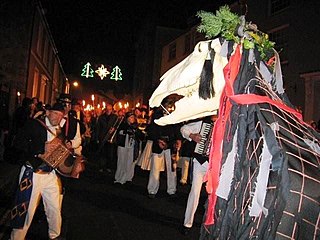Costume is the distinctive style of dress or cosmetic of an individual or group that reflects class, gender, profession, ethnicity, nationality, activity or epoch. In short costume is a cultural visual of the people.

Carnival is a Christian festive season that occurs before the liturgical season of Lent. The main events typically occur during February or early March, during the period historically known as Shrovetide. Carnival typically involves public celebrations, including events such as parades, public street parties and other entertainments, combining some elements of a circus. Elaborate costumes and masks allow people to set aside their everyday individuality and experience a heightened sense of social unity. Participants often indulge in excessive consumption of alcohol, meat, and other foods that will be forgone during upcoming Lent. Traditionally, butter, milk, and other animal products were not consumed "excessively", rather, their stock was fully consumed during Shrovetide as to reduce waste. This festival is known for being a time of great indulgence before Lent, with drinking, overeating, and various other activities of indulgence being performed. For example, pancakes, donuts, and other desserts are prepared and eaten for a final time. During Lent, lacticinia and animal products are eaten less, and individuals make a Lenten sacrifice, thus giving up a certain object or activity of desire.

A masquerade ball is a special kind of formal ball which many participants attend in costume wearing masks. Less formal "costume parties" may be a descendant of this tradition. A masquerade ball usually encompasses music and dancing. These nighttime events are used for entertainment and celebrations.

Junkanoo is a festival that was originated during the period of African chattel slavery in British American colonies. It is practiced most notably in Jamaica, The Bahamas and Belize, and historically in North Carolina and Miami, where there are significant settlements of West Indian people during the post-emancipation era. In the present day, there are considerable variations in performance and spelling, but there are the shared elements of masquerade, drumming, dance, and parading.

Egungun, in the broadest sense is any Yoruba masquerade or masked, costumed figure. More specifically, it is a Yoruba masquerade for ancestor reverence, or the ancestors themselves as a collective force. Eégún is the reduced form of the word egúngún and has the same meaning. There is a misconception that Egun or Eegun is the singular form, or that it represents the ancestors while egúngún is the masquerade or the plural form. This misconception is common in the Americas by Orisa devotees that do not speak Yorùbá language as a vernacular. Egungun is a visible manifestation of the spirits of departed ancestors who periodically revisit the human community for remembrance, celebration, and blessings.

The Trinidad and Tobago Carnival is an annual event held on the Monday and Tuesday before Ash Wednesday in Trinidad and Tobago. This event is well known for participants' colorful costumes and exuberant celebrations. There are numerous cultural events such as "band launch fetes" running in the lead up to the street parade on Carnival Monday and Tuesday. It is said that if the islanders are not celebrating it, then they are preparing for it, while reminiscing about the past year's festival. Traditionally, the festival is associated with calypso music, with its origins formulated in the midst of hardship for enslaved West and Central Africans; however, recently Soca music has replaced calypso as the most celebrated type of music. Costumes, stick-fighting and limbo competitions are also important components of the festival.

A costume party or fancy dress party is a type of party, common in contemporary Western culture, in which many of the guests are dressed in costume, usually depicting a fictional or stock character, or historical figure. Such parties are popular in the United States, United Kingdom, Canada, Australia, Ireland and New Zealand, especially during Halloween.

The Mummers Parade is held each New Year's Day in Philadelphia. Started in 1901, it is the longest-running continuous folk parade in the United States.

Winneba is a town and the capital of Effutu Municipal District in Central Region of South Ghana. Winneba has a population of 55,331. Winneba, traditionally known as Simpa, is a historic fishing port in south Ghana, lying on the south coast, 140 kilometres (90 mi) east of Cape Coast. The current member of parliament is Alexander Kwamina Afenyo-Markin.
The Efutu are an Akanized Guang people that are the original inhabitants of present-day Ghana. They founded the coastal area about 1390 C.E. The Efutu are found in Awutu, Adina, Senya-Beraku and Winneba and their main occupation is fishing. Like most Guans, they were somewhat absorbed into the greater Akan culture and adopted Akan names via annexing and military campaigns as the Akan were natural warriors. Similar to the Akuapem people of the Eastern Region of Ghana who are ruled by an Akan Abusua but was originally ruled by their own Guan kings. They also have adopted the Fante version of some Akan institutions and the use of some Fante words in their rituals. Before Akanization, the Simpa Kingdom was formed about 1400 AD.

The Yule goat is a Scandinavian and Northern European Yule and Christmas symbol and tradition. Its origin is from Germanic paganism and has existed in many variants during Scandinavian history. Modern representations of the Yule goat are typically made of straw.

The Antiguan Carnival is a celebration of the emancipation of slavery in the country held annually from the end of July to the first Tuesday in August. The most important day is that of the j'ouvert, in which brass and steel bands perform for much of the island's population. Barbuda's Carnival, held in June, is known as Caribana. The Antiguan and Barbudan Carnivals replaced the Old Time Christmas Festival in 1957, with hopes of inspiring tourism in Antigua and Barbuda. Some elements of the Christmas Festival remain in the modern Carnival celebrations.

Guise dancing is a form of community mumming practiced during the twelve days of Christmastide, that is, between Christmas Day and Twelfth Night in West Cornwall, England, UK. Today, guise dancing has been appropriated for feast days at other times of the year.

A masquerade ceremony is a cultural or religious event involving the wearing of masks. The practice has been seen throughout history from the prehistoric era to present day. They have a variety of themes. Their meanings can range from anything including life, death, and fertility. In the Dogon religion, the traditional beliefs of the Dogon people of Mali, there are several mask dances, including the Sigi festival. The Sigi entered the Guinness Book of Records as the "Longest religious ceremony".
Edgar Allan Poe's 1842 short story "The Masque of the Red Death" has been depicted and referenced numerous times in popular culture.

The Carnival of La Bañeza, in the province of Leon, is a festival declared of national tourist interest that began to gain importance and fame at the beginning of the 20th century during the repression under Franco, due to the prohibition of concealing one's face or wearing a costume. The main characteristic of La Bañeza's carnival is the absence of a costume competition with prizes and monetary compensation for participating, which may occur in carnivals elsewhere. Most of the city dedicates themselves wholeheartedly to the festival, passing on interest through generations. In many cases, participants prepare a year in advance, searching for accessories, fabrics, masks and acts they will perform, motivated by a "carnival feeling", lived during those days. Given this, the disorganized carnival is becoming increasingly popular, dressing up outside of parade hours, or on days without events, in the workplace, etc. looking to surprise and amaze the citizens and visitors.

The Ankos Festival also known as Takoradi street carnival or Masquerade Festival is an annual event celebrated by the people of Takoradi, Ghana. Its main attraction is dozens of groups of people or teams dressing in wild outfits who display their skills and arts via dance. The festival is usually celebrated from 24–26 December of every year, and is popular with tourists.

The Limassol Carnival Festival is an annual European carnival event held in Limassol, Cyprus.The event is held 12 days before the start of Lent, on the Sunday before Ash Monday, 50 days before Orthodox Easter. The festival is a colourful 10-day event of people eating, singing, satire, games, wearing costumes, and attending parties. The festival culminates with a large parade, which includes an array of floats traversing the city.
The Labyrinth of Jareth Masquerade Ball, shortened to LOJ or simply known as the Labyrinth Masquerade Ball, is an annual masquerade ball and cosplay event in Los Angeles, California. The ball was first held in 1997.















